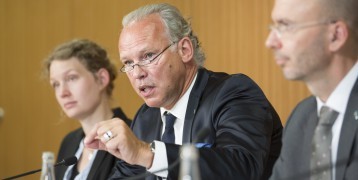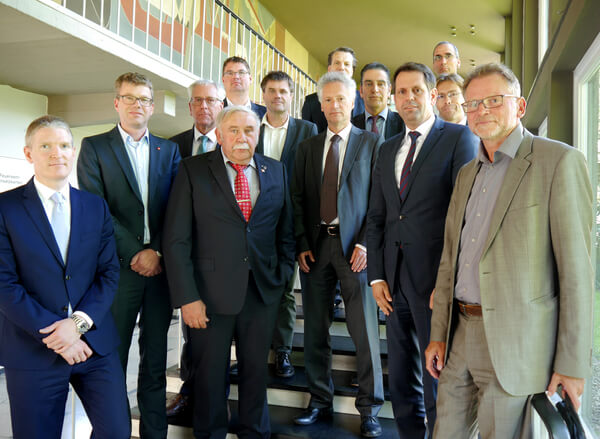News Release from windfair.net
Wind Industry Profile of
Until the Bubble Has Burst
First, German turbine manufacturer Senvion sent shock waves through the industry a few weeks ago with the announcement that they have to close their factory in Husum in the north of Germany. Further hardship also threatens the town of Bremerhaven, where the factory of manufacturer Adwen probably will also have no future. The company, once belonging to Gamesa, has become part of Siemens now, following the merger of their parent company with the German industrial giant. And Siemens has just built their own turbine factory in Cuxhaven resulting in the construction of a large offshore center there. The location in Bremerhaven is thus obsolete. Furthermore, Nordex and Vestas have seen a drop in sales recently sending more warning signals to the industry in the country.
Tendering system causes problems
The situation is being exacerbated by the recent calls for tenders, which have been compulsory in Germany since the beginning of the year. The new system brings a forced reduction in turbine installations from over 4,000 megawatts now to only 2,800 megawatts per year in the future. Further troubles are caused by the legal definition of 'citizen energy' which is causing a lack of predictability. Due to much longer deadlines for the realization of citizens' energy projects, the industry is facing a significant slump in expansion in the years 2019 and 2020. As opposed to this the relatively stable policy of the EEG (renewable energy law in Germany) in recent years has led to an unprecedented boom in the industry and the development of new technologies.
 However, the players of the industry are now getting robbed of their basis for further investments in the energy sector: "Given the average three to five-year licensing procedures [of the citizens' wind projects], project developers are also severely affected. A total of 143,000 jobs are on the brink. The Bundestag and the Federal Government must therefore act quickly," said Hermann Albers, President of the Federal Association for Wind Energy in Germany.
However, the players of the industry are now getting robbed of their basis for further investments in the energy sector: "Given the average three to five-year licensing procedures [of the citizens' wind projects], project developers are also severely affected. A total of 143,000 jobs are on the brink. The Bundestag and the Federal Government must therefore act quickly," said Hermann Albers, President of the Federal Association for Wind Energy in Germany.
Mood swing in the industry
Albers is supported by the German trade unions. For example, the IG Metall Coast yesterday presented the results of its annual survey, which testify to a mood swing in the industry: "The situation in wind industry is worsening – faster and more clearly than we feared," said Meinhard Geiken, district manager of the IG Metall. "A year ago there were no talks about dismissals and location closures, but now many companies are affected in both the on- and offshore sector."
For the survey, they asked works councils by companies along the entire industrial value chain located all over the country. As their statements show, the outlook for the industry has deteriorated considerably: although two-thirds of the surveyed companies currently still have full order books, the order situation is likely to deteriorate dramatically over the next two years. This is accompanied by a decline in employment, further layoffs and location closures.
Companies that are exclusively active in wind industry and thus unable to offset the situation through other business sectors are particularly affected. "We are worried about a massive slump in production," says Geiken. "In order to maintain employment and further improve the technology of the turbines, we need a more ambitious and, above all, reliable expansion target."

Economics Minister Olaf Lies with representatives of Lower Saxony associations and companies of wind energy (Image: Lower Saxony)
Politicians also demand improvements
Now the first politicians have reacted. Lower Saxony's Minister for Economic Affairs, Olaf Lies, for example, has teamed up with companies and associations involved and has developed a common position paper. "The companies have drawn attention to the dramatic situation of the industry as results of the first two tendering sessions. Contrary to the intention of the Federal Government to preserve the diversity of actors, few professional project developers have secured a large part of the tender volume. The consequences are a monopolisation of the market and a thread breakage in expansion in the coming years. This not only puts many qualified jobs in Germany at risk, but also our laboriously developed international standing in this industry," said Minister Lies.
It is now required to carry out improvements to the set of rules before the next round of tenders, which is planned for this year. The demands are simple: only projects with the necessary nuisance approval should be allowed to take part and projects which have been commissioned should be put into operation within 24 to 30 months. That's the only way for the industry to regain planning certainty and advance wind energy expansion in a reliable manner.
In view of the forthcoming general election in Germany, now would be the time for politicians to listen to the voices coming from an industry which has experienced an unprecedented upswing in recent years as every job in the wind energy sector also means one potential voter.
- Author:
- Katrin Radtke
- Email:
- press@windfair.net
- Keywords:
- wind energy, energiewende, energy transition, Germany, Senvion, Nordex, Vestas, IG Metall



























